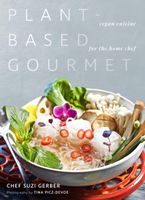Advertisement
Fermenting and Pickling
Appears in
Published 2021
Much like vinegars, fermented and pickled foods are under-consumed in most Western diets, and it’s really a shame. We should let these wonderful flavor enhancers, palate cleansers, digestives, and preserves become the star of the show.
Fermenting helps develop beneficial bacteria, while the vinegar used in pickling is intended to kill bacteria and keep more bacteria from forming. Some vinegars help with fermentation, but most kill the bacteria that is used for fermented pickling. Cultured, raw vinegar, like raw apple cider vinegar, is a prebiotic, with enzymes that break down food while also providing food for the healthy bacteria in our digestive system. These enzymes chemically change whatever is soaked in them, and the changes fast-track the metabolic processes of cooking and digestion and open new flavors and nutrient access. Distilled white vinegar, on the other hand, creates an anaerobic environment—one that is absent of oxygen—that is not enzyme-active, making it incredible for cleaning things like wooden cutting boards, but not so exciting as an ingredient. Distilled white vinegar is the most often-used vinegar for commercially available pickles, making those pickles safe and preserved but not as delicious and nutritious as pickles can be.

